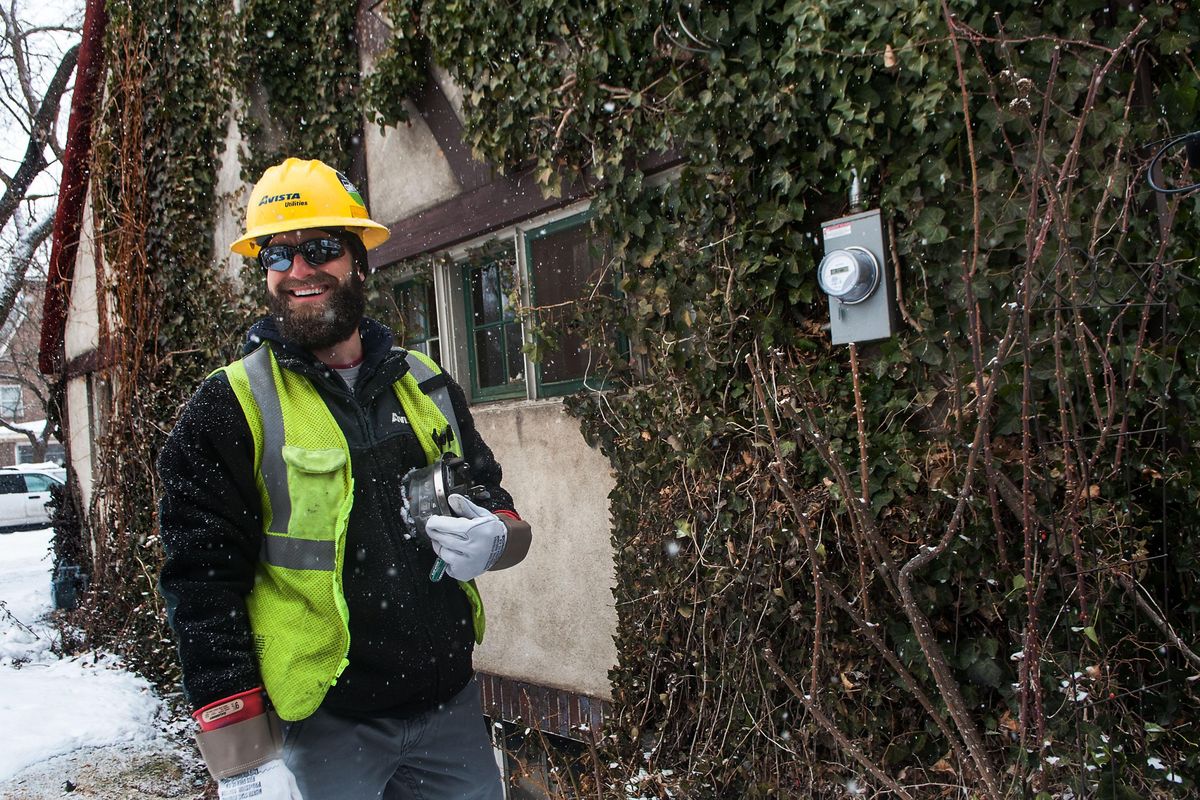Avista starts $165 million smart-meter rollout in Spokane

Vikkie and Al Naccarato’s historic Millwood home has character, charm and a hefty heating bill.
During the winter, the couple pays several hundred dollars monthly to heat the 1923 house, which is on the National Register of Historic Places.
“It doesn’t have the energy efficiency of today’s homes,” Vikkie Naccarato said. “We’ve added insulation, but we don’t want to get rid of the original windows, which are single-paned.”
On Wednesday, Avista installed a smart meter at the house, which will help the couple track their energy use in almost real-time. The installation is part of $165 million smart-meter rollout across Avista’s Washington service territory.
More than 400,000-plus electric and gas customers will get the meters. The rollout starts Friday in Spokane and will wrap up in late 2020 in the Colville area.
With a smart meter, the Naccaratos can sign up for alerts when their energy use hits predetermined thresholds. The alerts also will predict what their monthly bill will be.
Vikkie Naccarato already logs onto Avista’s online portal to look at the household’s energy use. “Most homes in Spokane are older, so everyone cares about their bill,” she said.
Avista’s current system allows her to see the past month’s usage, but not daily consumption. The couple will use the information to decide when to close off rooms and pull out the electric blankets.
Naccarato also likes knowing that when her power is out, the smart meter will alert Avista.
“You won’t come home after a long day, find out that your power is out, and have to call it in,” Naccarato said.
Liberty Lake-based Itron manufactured the smart-meter equipment. An Avista contractor will install the new electric meters and update existing natural gas meters with smart-meter modules. The cost of the equipment will be included in Avista’s future rate requests.
About 60 percent of U.S. households have smart meters, according to the Edison Electric Institute, which estimates that 76 million have been deployed nationally.
Itron has deployed more than 20 million of the same type of smart meters, in 10 countries, that will be installed in Spokane.
“Smart meters are more than a movement; they’re a foregone conclusion,” said Sharelynn Moore, senior vice president of Itron’s Networks Product Business Unit.
However, smart-meter adoption has been slower in the Pacific Northwest than other parts of the country for a couple of reasons, she said.
Smart meters caught on quicker in parts of the East Coast and the South, which have more frequent power outages from extreme weather, Moore said. In some cities where energy prices vary based on the time of day, smart meters became a necessity.
During the 2015 windstorm, when gale-force winds disrupted electricity to 180,000 Avista customers, some people were without power for 10 days. Heather Rosentrater, Avista’s vice president of energy delivery, said the utility could have restored power up to two days sooner if the smart meters had been in place.
Avista would have known how big the outage was almost immediately, she said. The utility could have called in additional contract crews to assist with power restoration.
Avista customers who don’t want a smart meter can opt out. To date, 174 customers have chosen that, Rosentrater said. Customers who opt out will pay a $75 upfront fee and $5 monthly to continue to have their meter read. The fees are set by the state.
Safeguards are in place to protect customer privacy, Avista and Itron said. Smart meters measure customers’ energy use and send the information to a network router installed on a nearby utility pole. The data is sent to Avista through a secure satellite or cellular signal.
The meters don’t store or transmit personal customer information, such as names or addresses, Moore said. Encrypted information about energy use is sent through low-power-frequency radio waves to Avista. The utility matches the data about energy use with customer information.
The information is transmitted three times daily, which puts the radio frequency exposure from smart meters at a fraction of other household devices, such as cellphones and microwaves, according to Avista.
Itron’s Moore sometimes gets asked about smart meters causing fires. In Canada, there have been a limited number of smart-meter-caused fires, although those meters were not made by Itron, she said.
The problem was faulty wiring in the building, Moore said. Installers are trained to catch the problem, and Itron’s smart meters shut down if there’s a fire danger, she said.
Moore and her husband, Jason, have been anticipating the arrival of smart meters in their Comstock neighborhood.
The couple has a swimming pool and a leaking hot tub. They want to know which is the worst energy hog, so they can decide whether to buy a new pool heater or a new hot tub.
“My husband called Avista several times to ask if we could be included in a smart-meter pilot,” Moore said.
He even told Avista the couple’s dog posed problems for meter readers, but the utility’s employees didn’t buy it.
“They said, ‘Lucy? Our notes indicate that she’s a very friendly dog,’ ” Moore said.